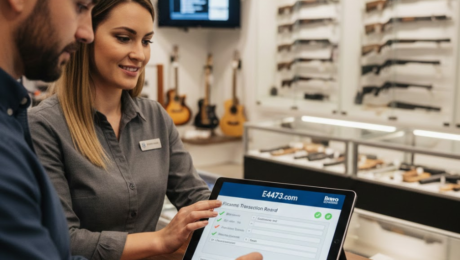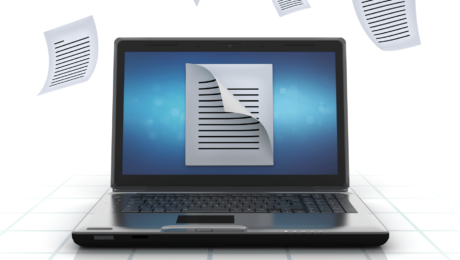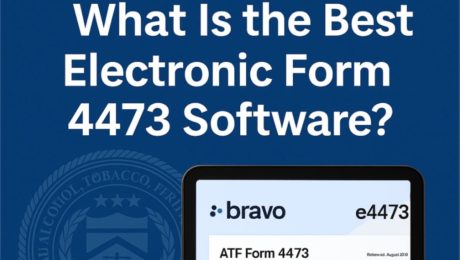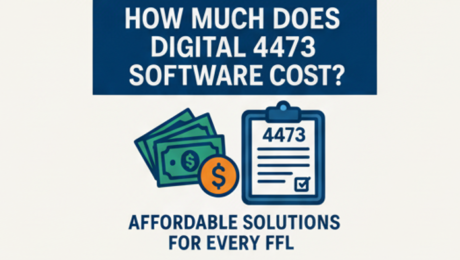What Is ATF Form 4473? A Practical Guide for FFLs and Pawn Shops
Tuesday, February 03 2026
If you’re a Federal Firearms Licensee (FFL) or a pawn shop adding firearms, ATF Form 4473 is one of the most important documents in your operation. To customers, it’s often referred to as “the background check form.” To licensees, it’s a legal firearm transfer record that directly impacts your compliance posture during ATF inspections. In today’s regulatory environment, even small clerical mistakes on Form 4473 can result in findings. Below, the teams at Bravo Store Systems and e4473.com break down what Form 4473 is, when it’s required, and how professionals manage it correctly. What Is ATF Form 4473? ATF Form 4473 (Firearms Transaction Record) documents the transfer of a firearm from an FFL to a non-licensee. Any time a firearm leaves your A&D (Acquisition & Disposition) record—including: Retail sales Trades Pawn redemptions …a properly completed Form 4473 is required, in accordance with current federal and applicable state requirements. Pawn Shop Note For pawn shops, when a firearm is redeemed and returned to the customer from licensed inventory, it is considered a disposition and typically requires: A new Form 4473 A background check consistent with federal and state procedures This applies even if the customer previously owned the firearm. Why Professionals Use Digital e4473 Systems Manual, paper-based 4473 processes are a common source of compliance errors. Many FFLs use digital e4473 solutions, such as Bravo Store Systems with native e4473, to reduce risk and improve accuracy. Electronic Form 4473 workflows are permitted under current ATF guidance when required conditions are met. Key Advantages of Digital e4473 Workflows Error-Aware Guidance Digital 4473 workflows guide users through required fields using conditional logic, helping prevent omissions before the form can be finalized. A&D Alignment When completed within Bravo, Form 4473 data remains aligned with your electronic A&D bound book, reducing mismatches between transfer records and inventory logs. Electronic Retention Under current ATF guidance, FFLs may retain Form 4473 records electronically (and scan legacy paper forms) when conditions such as read-only integrity and ready retrievability are met. Recent rule changes require FFLs to retain Form 4473 records for as long as the business remains licensed, eliminating the previous 20-year destruction allowance. Digital retention can significantly reduce the long-term storage burden. Inspection-Friendly Access With properly controlled, read-only access, licensees can provide investigators with the records they need while restricting unrelated data—streamlining inspections and trace responses. Common Form 4473 Compliance Pitfalls (and How Digital Systems Help) Address Mismatch Paper processes may miss when a buyer’s ID address is outdated. Digital systems can prompt for acceptable supplemental government documentation when a discrepancy is detected. Missing Race or Ethnicity Fields The current Form 4473 requires both ethnicity and race selections. Digital validation enforces completion of required fields before the transaction can proceed. Illegible Handwriting Paper entries can be difficult to read during an audit. Digital entry ensures names, addresses, and serial numbers are clear and consistent. Missing Signatures In busy stores, required signatures can be overlooked. Digital workflows prevent closing a transaction until all required signatures are captured. The Professional Standard: Go Paperless Running a modern firearm or pawn operation without an integrated e4473 system is increasingly risky and inefficient. With e4473.com integrated into Bravo Store Systems, licensees move beyond paperwork and into a repeatable, auditable workflow aligned with: Current ATF guidance on electronic 4473 usage Electronic record retention requirements The latest Form 4473 revisions Ready to Strengthen Your FFL Operations? Don’t wait for an inspection to uncover gaps in your process. Retailers improve accuracy and efficiency by automating compliance workflows. Try Bravo e4473 + POS Make your busiest days feel routine. Bravo’s integrated e4473 + POS supports: Required-field enforcement Address and ID logic Clear, readable records Real-time A&D alignment Compliant electronic retention with rapid retrieval for traces and inspections Book a 20-minute demo Disclaimer: This article is for informational purposes only and does not constitute legal advice. FFLs should always consult the latest ATF rulings and their local Industry Operations Inspectors (IOI) for specific compliance requirements.
- Published in ATF, Business Portal, Cloud Storage, Form 4473, Gun Stores, Uncategorized
No Comments
How Long FFLs Must Retain ATF Form 4473 Records
Thursday, January 15 2026
For every Federal Firearms Licensee (FFL), maintaining accurate and complete records is essential for smooth operations and ATF inspections. The ATF Form 4473—the Firearms Transaction Record—is a core part of that responsibility. Record retention rules for Form 4473 are determined by federal regulation and depend on whether the firearm transfer was completed or not completed. Two ATF Retention Requirements Federal law outlines two distinct retention periods for Form 4473 records. 1️⃣ Completed Firearm Transfers (Firearm Transferred) If the transfer is completed, the FFL must retain the Form 4473 for: ✔ 20 Years Retention begins on the date the firearm is transferred to the customer. This long-term requirement supports law-enforcement trace requests and ensures records are available during ATF inspections. 2️⃣ Transactions Not Completed (Denied or Canceled) If the transaction is not completed—including canceled sales, NICS denials, or incomplete transfers—the FFL must retain Form 4473 for: ✔ 5 Years Retention begins on the date the transaction was canceled or denied. 🔑 Why Proper Record Retention Matters Audit Readiness During inspections, ATF Industry Operations Investigators will review your historical 4473 records to confirm all required forms are present and retained for the correct amount of time. Trace Requests Accurate records help ATF trace firearms recovered in investigations. Missing or incomplete files may cause delays. Avoiding Violations Missing or misfiled forms—even from many years ago—can be cited and may contribute to patterns of non-compliance. 🗃️ Record Storage Considerations Managing two decades of physical 4473s can become challenging for growing FFLs. Paper forms take up space, can be misfiled, and are vulnerable to damage. Many retailers now prefer digital retention solutions that support: ✔ Secure storage Protected from physical damage or loss. ✔ Fast search capability Makes it easier to respond to trace requests or prepare for inspections. ✔ Retention aligned with ATF rulings Digital retention systems help ensure records remain available for the full required period. If your filing cabinets are reaching capacity or your team struggles with retrieval, it may be time to consider a digital workflow. 🎯 Want to Simplify 4473 Record Retention? Learn how Bravo Store Systems supports electronic 4473 workflows, digital retention aligned to ATF rulings, and audit-ready access that helps FFLs stay organized every day. 👉 Request a Bravo e4473 Walkthrough
- Published in ATF, Bulletproof Security, Business Portal, Cloud Storage, Form 4473, Gun Stores, Uncategorized
🛡️ The Single Biggest Cause of ATF Form 4473 Errors (And How to Fix It)
Tuesday, December 09 2025
The ATF Form 4473, officially the Firearms Transaction Record, is the backbone of every legal, over-the-counter firearm sale in the United States. For both the Federal Firearms Licensee (FFL) and the buyer (transferee), completing it accurately is non-negotiable. Yet errors remain common. A single mistake on a paper ATF Form 4473 isn’t just a minor inconvenience that halts a transaction; it represents a significant compliance failure that puts your entire business at risk. During a routine ATF compliance inspection (audit), such errors can result in Financial Penalties, License Jeopardy. It’s critical to have a good defense against penalties and license revocation. So what’s the biggest culprit behind these compliance headaches? The Biggest Cause: Incomplete or Inconsistent Information in Section A While dealer-side errors in Sections B and C can lead to more serious violations, the majority of form rejections begin in Section A ,the portion completed by the buyer. Most issues stem not from intent but from inconsistency or inattention. Even small variations between the buyer’s written information and their photo ID can cause mismatch and administrative rejection. 1️⃣ Inconsistent Residential Address (Box 10) This is the top cause of administrative delays. The ATF requires the transferee’s current physical residential address to be listed in Box 10, and it must match the address on the government-issued photo ID presented to the FFL. The Common Error: A buyer writes their current address, but their ID still lists an old address. Or, they add “Apt. 2B” while their ID shows only “2B.” Even small discrepancies can trigger a rejection, requiring the buyer to provide additional proof (such as a vehicle registration or utility bill). 2️⃣ Misinterpreting the “Prohibited Person” Questions Section A also includes questions about a buyer’s legal eligibility to possess firearms (21.b, 21.g, 21.i, 21.j, etc.), covering felony convictions, restraining orders, unlawful substance use, and more. The Common Error: Buyers may misread these legal definitions. For example, assuming a dismissed charge doesn’t apply when it legally does. Incorrectly marking “No” where the correct answer is “Yes” (or vice versa) can constitute a felony and lead to a NICS denial. 3️⃣ Missing Dates, Signatures, or Checkmarks Every box on the Form 4473 has legal significance. It’s common for buyers to forget to check a box, skip the date (Box 18), or miss the signature (Box 19). The FFL cannot continue the transaction until every required field is completed correctly. ✅ How to Prevent 4473 Errors For Buyers: Bring a Current ID: Ensure your driver’s license or government ID matches your current physical address. If not, bring a supplemental document that proves residency. Read Carefully: Review each question closely. If you’re unsure, ask the dealer before answering. Double-Check Everything: Verify every “Yes” or “No,” date, and signature before submission. For Dealers: Verify ID Accuracy: Confirm the photo ID matches the buyer and that the address aligns with the entry in Box 10. Review Section A: Before completing your portion, check for consistency and completeness. Log Details Correctly: Record the NICS check date/time, result, and disposition information immediately. 💡 How Bravo Store Systems Helps Bravo’s E4473 eliminates these manual risks by guiding the process digitally: Validation at Entry: Buyers can’t skip required boxes or sign before all mandatory fields are completed. Automated Logic: Bravo’s Ee4473 applies ATF rules at every step, ensuring required documentation (like proof of residency) is entered correctly. Digital Accuracy: No handwriting errors, no missing checkboxes, and no unreadable entries. Retention to Spec: All digital 4473s are stored securely per ATF Ruling 2022-01, ensuring 20-year retention with audit-ready accessibility. Result: Fewer corrections. Faster transactions. Complete peace of mind for your FFL. 🎯 Ready to Eliminate 4473 Errors for Good? See how Bravo Store Systems E4473 helps FFLs stay accurate, compliant, and audit-ready 24/7. 👉 Request a 15-Minute Demo Today
- Published in ATF, Bravo POS, Bravo Store Systems, Bulletproof Security, Cloud Storage, Form 4473, Gun Stores, NICS, Uncategorized
🛡️ How to Prepare for an ATF Inspection: Staying Audit-Ready Every Day
Tuesday, December 02 2025
For every Federal Firearms Licensee (FFL), an inspection by the Bureau of Alcohol, Tobacco, Firearms and Explosives (ATF) is part of doing business. An ATF inspection isn’t meant to punish—it’s meant to check that your records and processes follow federal rules. The best defense? Be audit-ready 24/7, not just when the inspector calls. 🔑 Key Takeaways Technology reduces errors: Digital A&D and electronic 4473 systems reduce the mistakes that create violations. Compliance is daily: Your A&D book must be accurate at the end of every business day. Training matters: Every employee who handles firearm paperwork must know the rules and your SOPs. Inspectors focus on four areas: A&D book, 4473s, inventory security, and background check procedures. 1️⃣ Keep a Clean and Accurate A&D Book Your Acquisition & Disposition (A&D) book is the first thing an ATF inspector checks. Every firearm must be logged accurately at the moment it is received or transferred. Record acquisitions and dispositions immediately. Make sure entries are complete, legible, and in the correct order. Review your A&D book daily to confirm everything is up to date. Even small gaps or delays can cause violations during an inspection. 2️⃣ Ensure Every Form 4473 Is Correct The ATF Form 4473 documents every firearm sale. Errors here are one of the most common inspection findings. Check that every required field is answered. Confirm that the buyer’s ID matches the information in Section A. Make sure dates, signatures, NICS details, and disposition information are accurate and complete. Keep all 4473s organized and accessible for the full retention period. A quick review before filing can prevent the most common issues. 3️⃣ Reconcile and Secure Your Inventory Inspectors compare a sample of your physical inventory to your A&D book. Regularly perform internal audits by scanning inventory and comparing them to your records. Investigate any mismatches right away. Report missing or stolen firearms immediately to ATF and local law enforcement and document the event. Keep storage areas secure with proper locks, alarms, and surveillance. Staying proactive prevents surprises during inspection. 4️⃣ Train Your Staff and Follow SOPs Compliance is a team effort. Make sure every employee understands your store’s procedures for logging firearms, running transfers, and completing forms. Train new employees and provide refresher classes for current employees. Keep written SOPs that explain exactly how each process should be handled. Maintain training records—inspectors may ask to see them. Clear, consistent processes reduce mistakes. 5️⃣ Managing the On-Site Inspection When the inspector arrives, staying organized and professional goes a long way. Designate one Responsible Person to communicate with the inspector. Provide a clean workspace and quick access to records. Stay calm and answer questions directly. Review any findings in the Report of Violations and document how you will correct them. A well-run inspection shows your business takes compliance seriously. 🧭 Conclusion: Daily Habits Create Audit Confidence Preparing for an ATF inspection isn’t about last-minute scrambling—it’s about following the right processes every day. Accurate A&D entries, complete 4473s, consistent training, and organized records are what keep your FFL protected year-round. This daily discipline is even easier with the right tools. Bravo Store Systems helps FFLs stay audit-ready by digitizing 4473s, enforcing required fields at entry, maintaining secure digital retention, and keeping the A&D book accurate as you work. Stay confident. Stay compliant. Stay ready—every day. 👉 See How Bravo Keeps FFLs Audit-Ready 24/7 Request a 15-Minute Walkthrough
- Published in ATF, Bravo POS, Bravo Store Systems, Bulletproof Security, Business Portal, Cloud Storage, Form 4473, Gun Stores, Uncategorized
🛡️ How Digital Form 4473 Helps Prevent ATF Violations
Tuesday, November 25 2025
For any Federal Firearms Licensee (FFL), the ATF Form 4473 is the most critical compliance document. Unfortunately, errors on paper forms—missing fields, illegible handwriting, or incomplete responses—remain among the top violations cited by the ATF every year. Moving to a digital ATF eForm 4473 system isn’t just about saving paper. It’s about strengthening compliance by reducing manual errors, enforcing accuracy, and making your store audit-ready 24/7. Here’s how an e4473 solution helps FFLs proactively prevent violations and safeguard their operations. 1️⃣ Reducing the #1 Violation: Missing or Incomplete Information Paper forms are prone to simple but costly mistakes. A digital e4473 system ensures accuracy and completeness before the form can be finalized. Guided Workflow: Customers complete every required field on a tablet or computer. The form cannot be submitted or digitally signed until all mandatory fields are filled in correctly. Built-In Validation Logic: The software follows ATF rules to guide responses. For instance, if a customer indicates “Yes” to being a non-U.S. citizen, the system automatically prompts for additional documentation and relevant follow-up questions, reducing the risk of omissions. Instant Error Alerts: If an entry doesn’t match the expected format (like an invalid ID number), the system flags it immediately—so corrections happen before submission, not after inspection. Bravo Note: Bravo’s E4473 validates every field at entry and enforces completion before saving, helping eliminate omissions and improve inspection outcomes. 2️⃣ Reducing Risk Around Prohibited Transfers While the NICS check determines eligibility, incomplete or mishandled 4473 data can still create compliance exposure. Review Prompts: Many e4473 solutions, including Bravo’s, surface mandatory review prompts when customers answer “Yes” to disqualifying questions—This ensures the FFL verifies each case before transferring a firearm. Automatic NICS Tracking: Bravo’s E4473 automatically records the date and time the NICS check was initiated and the final response, preventing one of the most common recordkeeping violations: missing or inaccurate NICS contact information. 3️⃣ Strengthening Record Retention and Trace Response Compliance doesn’t stop at the point of sale. Paper forms must be securely retained for 20 years, which introduces physical risk and retrieval delays. Digital Record Protection: Electronic storage protects records from loss, fire, water damage, and deterioration. Bravo’s E4473 retention follows the ATF rRules ensuring data redundancy, security, and retrieval standards are met. Fast Trace Requests: With digital retention, FFLs can search by serial number, customer name, or transaction date in seconds. When ATF requests a trace, a process that once took hours can now take minutes—improving both efficiency and compliance confidence. ✅ The Bottom Line: Proactive Compliance, Not Reactive Fixes Switching to an electronic 4473 system moves your FFL from a reactive position—fixing errors after they’re found—to a proactive one that prevents mistakes before they occur. It saves hours of manual audit prep, reduces violations, and gives your staff more time to focus on what matters most: customers and sales. 👉 See How Bravo E4473 Works Learn how Bravo Store Systems helps FFLs stay confident, compliant, and audit-ready every day. [Request a 15-Minute Walkthrough]
- Published in ATF, Bravo POS, Bravo Store Systems, Bulletproof Security, Business Portal, Cloud Storage, Form 4473
🥇 What Is the Best Electronic Form 4473 Software? Why Bravo’s E4473 Leads the Way
Tuesday, November 18 2025
When it comes to firearm sales, compliance is everything. Every Federal Firearms Licensee (FFL) knows that even small mistakes on the ATF Form 4473 can lead to costly violations or delays. That’s why thousands of dealers are switching from paper forms to digital workflows. The most complete and trusted solution available today is Bravo Store Systems E4473 — a secure, easy-to-use system that keeps your store audit-ready 24/7. Why Bravo’s E4473 Is the Gold Standard for Compliance Bravo’s E4473 isn’t just an online form. It’s part of a complete digital compliance system that connects every step of your operation — from sales to record retention — in one place. ✅ 1. Digital Done Right — Faster, Cleaner, Audit-Ready Bravo’s E4473 isn’t just a digital version of a paper form — it’s a complete compliance upgrade. Every form is legible, automatically stored, and linked directly to your A&D Bound Book. When a trace request comes in, you can find the firearm, pull the attached 4473, and send the record in minutes — no more digging through boxes or handwritten forms. Every step — from customer entry to final signature and digital storage — is paperless, organized, and audit-ready 24/7. 🔗 2. Built Into the Bravo POS System Bravo’s E4473 is natively integrated with the Bravo Point of Sale (POS) and electronic Acquisition & Disposition (A&D) Bound Book, keeping every record accurate and in sync. – Complies with ATF regulation 27 CFR 478.125 — A&D entries made at the time of transaction. 💡 3. Smart Form Logic That Prevents Mistakes Bravo’s smart logic guides each customer step-by-step, skipping non-relevant questions and flagging any missing or problematic answers before the form can be completed. This ensures safety, accuracy and reduces follow-up work. 🧾 4. Automatic Multiple-Sale Reports When a customer buys more than one firearm, Bravo automatically detects the event and generates the required ATF Form 3310.4 (Handgun) or 3310.12 (Rifle) — eliminating manual compliance tasks. 🔍 5. Integrated NICS Background Check Bravo connects directly to the National Instant Criminal Background Check System (NICS), allowing staff to prefill data, submit checks faster, and minimize transcription errors. 🔒 Secure and Compliant — With Optional Cloud Storage Bravo’s E4473 meets all electronic storage requirements outlined in ATF Ruling 2022-01 and Final Rule 2021R-05F. Every form is encrypted, access-controlled, and retained securely for the full 20-year period required under 27 CFR 478.129 when digital storage is enabled. For stores that prefer added convenience, Bravo’s E4473 Cloud Storage is available as an optional feature, providing safe, centralized access to your 4473 records, along with an ATF audit portal for faster, less-stress audits. Regulatory Note: ATF does not certify POS vendors. Bravo aligns with current ATF rulings and provides verifiable audit artifacts to support compliance readiness. Why Dealers Choose Bravo’s E4473 Bravo’s E4473 helps firearm retailers combine compliance, accuracy, and efficiency — transforming required recordkeeping into a modern, reliable workflow. 🛑 Eliminate Costly 4473 Errors Real-time validation prevents incomplete or incorrect forms before they’re saved — helping you avoid rework, delays, and inspection findings. 🕒 Stay Audit-Ready 24/7 Every E4473 is automatically time-stamped, indexed, and stored to specification, so records are available in seconds during ATF inspections. ⚙️ Simplify Compliance Without the Stress Automated logic, instant A&D posting, and built-in multiple-sale reporting let your staff focus on customers instead of paperwork. 🚀 Accelerate Every Transaction, Safely Integrated NICS submissions and auto-filled fields reduce time per sale, improving customer flow and freeing staff for more valuable work. 💼 Strengthen Your Reputation A fast, accurate, and fully digital process builds customer confidence and demonstrates professionalism during audits or compliance checks. The Bottom Line For FFLs who want confidence, speed, and precision in every firearm sale, Bravo E4473 delivers the edge: fewer errors, faster service, and full peace of mind — all in one audit-ready platform. 📞 See Bravo E4473 in Action
- Published in ATF, Bravo POS, Bulletproof Security, Business Portal, Cloud Storage, Company News, Form 4473, Gun Stores, Holiday Gift Guide, NICS, Uncategorized
How Much Does Digital 4473 Software Cost?
Tuesday, November 04 2025
For every Federal Firearms Licensee (FFL)—from new startups and family-run shops to growing multi-store operations—the question of going digital is no longer about if, but when. It’s not just efficiency—it’s smart, affordable compliance that scales as you do. Modern Digital 4473 Pricing — Clear, Simple, Scalable Gone are the days of complicated tiers and setup fees. Bravo Store Systems now offers a single, transparent pricing model built around its modular Firearms Hub — the all-in-one compliance suite for modern firearm retailers and pawn FFLs. 🔐 Firearms Hub — $129/month Your Firearms Hub includes every compliance feature you need to stay audit-ready and efficient from day one: ATF eForm 4473 (electronic Form 4473 with digital retention) Automated Form 3310s (multiple handgun sale reporting) Vendor Catalog Integrations (RSR, Lipsey’s, Davidson’s, and more) Firearm Transfers (FFL-to-FFL workflow built in) eNICS Chrome Extension (streamlined background check process) Gunsmithing + Special Orders (track work orders and repairs easily) 💡 No setup fees. No hidden add-ons. Just one straightforward monthly price: $129 per store, per month. Flexible by Design — Pay for Only What You Need Bravo’s modular Hub System lets you build the exact solution your business requires. Each Hub adds a core set of tools — such as Firearms, E-commerce, or Pawn & Retail — and you can add or remove them anytime as your business evolves. Your business. Your mix. Your control. Our team works directly with each store to configure the right combination of Hubs and add-ons — ensuring you pay only for what you use and get the ROI you expect. Why Bravo Is a Smart Investment Instant Risk Reduction: Every 4473 is validated at entry, helping you catch errors before they reach your bound book. Automated Compliance: Forms 3310 and NICS checks are automatically handled within your workflow. Faster Daily Flow: No manual entry or paper filing — transactions post directly to your bound book in real time. Audit-Ready Confidence: Records are retained to ATF specifications and accessible through a secure, licensee-controlled auditor login. 🎯 The Bottom Line For $129/month, Bravo’s Firearms Hub transforms compliance from a paperwork headache into a competitive edge. It’s the simplest, most complete, and most cost-effective way to stay audit-ready 24/7 while streamlining your operations. See how easy audit-ready compliance can be. Schedule your free demo today and find the right Bravo Hub for your store
- Published in ATF, Bravo POS, Bravo Store Systems, Bulletproof Security, Cloud Storage, Form 4473, Gun Stores, NICS, Uncategorized
Why You Should Switch to Electronic Form 4473: Digital 4473 — Faster, Cleaner, Safer.
Wednesday, October 29 2025
In the firearms industry, the paper Form 4473 isn’t just an outdated document—it’s a productivity bottleneck. From endless handwriting to manual reviews, this paper-heavy process creates headaches for your team and risk for your business. Still using paper? Every single day you’re incurring unnecessary costs, facing compliance risks, and wasting valuable time. The real question isn’t whether you should switch to an electronic Form 4473—but why haven’t you yet. Here’s a breakdown of the hidden costs of paper and how switching to a digital solution like Bravo E4473 can pay for itself. The Hidden Costs of Paper Human Error: The #1 Source of ATF Violations Illegible handwriting, skipped fields, and correction errors lead to rework and citations. This puts your FFL at risk and could cost you fines or worse. Wasted Time: Payroll on Paper Your team spends too much time reviewing, correcting, and filing paper forms instead of selling and serving customers. Compliance tasks should never eat into your profits. Audit Headaches: Slow Retrieval & Increased Risk Paper records are a pain to retrieve. ATF audits mean sifting through piles of paper—time-consuming and stressful. Storage Costs: Valuable Space Wasted Storing 20 years of paper records is required by law, but that space could be used to display products or improve customer experience. The E-Form Advantage: Why Digital Pays You Back Switching to an electronic Form 4473 system eliminates these pitfalls, transforming compliance from a burden into a seamless part of your daily workflow. Eliminate Human Error (Protect Your FFL) Digital systems have built-in compliance checks to ensure every field is completed accurately and legibly. No more unreadable handwriting. Mandatory fields ensure nothing is missed. Guided corrections reduce rework and prevent costly mistakes. Reclaim Staff Time (Boost Productivity) With instant validation and a streamlined process, your team will spend less time on paperwork and more time on customers. Instant review cuts correction time by up to 90%. Faster transactions mean faster sales. No filing or sorting required—ever. Stress-Free Audits (Instant Retrieval) When the ATF shows up, you’ll be ready. All records are indexed and stored securely in the cloud. Retrieve any form in seconds, reducing audit time and stress. Save Storage Costs (Maximize Retail Space) Say goodbye to filing cabinets and wasted space. Secure digital storage removes the physical burden of 20 years of recordkeeping. Reclaim square footage for higher-value use, like product displays or service counters. It’s an Investment, Not an Expense Switching to electronic Form 4473 is a smart business decision that protects your FFL, increases efficiency, and saves valuable time and space. The reduction in errors and reclaimed productivity alone ensures your digital solution quickly pays for itself—while keeping you audit-ready every single day. Bravo and E4473.com: Partners in a Seamless Transition Switching to digital doesn’t have to be complicated. Bravo Store Systems, together with E4473.com, brings you the experience, tools, and support to modernize your compliance workflows with confidence. From setup to training, we’re here to ensure your transition is seamless, and your records stay audit-ready 24/7. Upgrade Your Compliance with Bravo’s Digital 4473 Solution Switching to digital doesn’t have to be complicated. Bravo Store Systems brings you the experience, tools, and support needed to modernize your compliance workflows with confidence. From setup to training, we’re here to ensure your transition is seamless, and your records stay audit-ready 24/7. Our Customers Agree Rating: ⭐⭐⭐⭐⭐ (5/5) Source: Facebook/Social Media Post Business: Pawn Montana Inc. Customer: Clint Wheeler Testimonial: “Bravo’s E4473 is so seamless. All our customers say it’s the best/easiest one in town to buy from. Cuts out human error and my ATF auditor said it was the best he has ever delt with. Just made the change to cloud storage 4473’s. No more boxes or holding forever. Can’t say enough about how bravo streamlines my business.” Ready to see how electronic 4473 transforms compliance into confidence. Get a firsthand look at how fast, accurate, and audit-ready your operation can be. 👉 Book the Walkthrough
- Published in ATF, Bravo POS, Bravo Store Systems, Bulletproof Security, Business Portal, Form 4473
Ditch the Paper, Slash the Costs: Why Digital Form 4473 Pays for Itself
Tuesday, October 21 2025
For Federal Firearms Licensees (FFLs), compliance isn’t optional — it’s the backbone of your business. But every paper ATF Form 4473 you file carries hidden costs: hours of labor, storage fees, and the ever-present risk of clerical error. E4473 by Bravo Store Systems replaces that friction with automation, accuracy, and audit-ready confidence — built right into your point of sale. The Hidden Costs of Paper 📜 Paper may look cheap, but it drains profit in four ways: Pitfall: Human Error – Hidden Cost: The #1 source of ATF violations. Handwriting, skipped fields, and correction errors create rework, citations, and risk. Pitfall: Time Sink – Hidden Cost: Staff spend paid hours reviewing, correcting, and filing forms instead of helping customers. Pitfall: Audit Stress – Hidden Cost: ATF audits mean digging through cabinets and boxes—slow retrieval increases inspection time and exposure. Pitfall: Storage Overhead – Hidden Cost: You pay for valuable space to store 20 years of records that could live securely in the cloud. The ROI of Going Digital 💰 Transitioning to a digital 4473 isn’t a tech upgrade — it’s a profitability move that saves time, eliminates errors, and protects your license. Fewer Errors, Greater Protection E4473 validates every field before submission, preventing the mistakes that drive most ATF violations. Real-time validation: Customers can’t skip required questions or enter invalid data. Built-in help text: Clarifies confusing items, reducing clerk intervention. Perfect legibility: Every form is clean, consistent, and auditor-ready — no handwriting to interpret. Result: fewer corrections, faster audits, and less stress for your compliance team. Time Saved Is Revenue Earned Every minute not spent on paperwork is a minute spent selling, serving, or training. Accelerated completion: Customers fill out the digital 4473 on a kiosk or tablet — no duplicate data entry. Instant retrieval: Locate any form in seconds instead of hours. Integrated workflows: E4473 connects with NICS and your A&D Bound Book for automatic updates. That’s how Bravo turns compliance time into business time. Lower Overhead, Higher Security Cloud retention: Records are securely stored for the full 20-year retention period — accessible anywhere, anytime. No paper storage: Free up square footage for merchandise, not filing cabinets. Disaster-ready backups: Protection against fire, flood, or theft — risks that destroy paper but not encrypted cloud data. Make the Switch with Bravo Store Systems Migrating from paper to digital compliance can sound daunting, but Bravo Store Systems makes it simple. E4473 is fully integrated with Bravo Point of Sale, giving you one system for sales, loans, and firearms compliance — no plug-ins, no double work. Unified workflow: Sell an item, auto-generate the digital 4473, update your bound book — all in one motion. Audit-ready 24/7: Digital retention to ATF spec; export in clicks, not hours. Expert support: Bravo’s firearms specialists understand ATF protocols and help your team stay inspection-ready year-round. Stop paying for inefficiency. Start operating with precision, speed, and compliance built in. 👉 See How E4473 Works ›
- Published in ATF, Bravo POS, Bravo Store Systems, Bulletproof Security, Business Portal, Cloud Storage, Company News, Form 4473, Gun Stores, NICS, Uncategorized
Navigating FFL Operations During a Federal Government Shutdown
Tuesday, October 14 2025
Expert Guidance from E4473 (a product of Bravo Store Systems) As of October 1, 2025, the federal government has officially entered a shutdown following Congress’s failure to pass a budget. For Federal Firearms Licensees (FFLs), this moment demands clarity, precision, and proactive compliance. Understanding which federal functions remain active—and which do not—is critical to maintaining lawful operations. At E4473 (Part of Bravo Store Systems), our mission is to provide the most trusted digital infrastructure for ATF compliance—purpose-built to help FFLs maintain accuracy, continuity, and audit-readiness even during federal uncertainty. Federal Functions Affected by the Shutdown Several essential ATF functions are temporarily paused until federal funding is restored: ATF NFA Branch Closed: The National Firearms Act (NFA) Branch has suspended all reviews and approvals. While Form 1, Form 3, and Form 4 submissions can still be filed, no processing will occur until staff return. Distributor Transfers (Form 3s) Paused: Distributors cannot ship regulated items (e.g., silencers) unless their Form 3 was pre-approved, restricting inventory flow. Customer NFA Transfers Delayed: Examiner review of customer Form 4s is paused, delaying final delivery of NFA items. FFL Licensing Center Frozen: New FFL and SOT applications and renewals are on hold until normal operations resume. Functions That Remain Operational Not all systems stop during a shutdown. Key services essential to daily firearm sales continue: FBI NICS Checks Remain Active: The National Instant Criminal Background Check System remains operational, allowing firearm transfers using Form 4473 without interruption. Form 4473 Processing Unaffected: Daily sales and transfers may continue as usual, provided all Form 4473 entries are accurate and complete. Pro Tip: Use the downtime to prepare NFA transactions—capture customer data, collect fingerprints, and pre-fill digital forms so submissions are ready when ATF systems reopen. Strengthening Compliance Amid Uncertainty Periods of political uncertainty often bring increased firearm activity. With higher transaction volume and reduced federal oversight, compliance precision matters more than ever. Paper-based 4473 errors—such as missing initials or incorrect dates—remain violations that can trigger citations or even license risk. That’s where Bravo E4473 delivers proven protection: Digital Precision → No Paper Errors Built-in field validation and automated compliance checks eliminate manual mistakes before they happen. Audit-Ready 24/7 Every record is securely stored, organized, and instantly exportable—so inspection readiness is never in question. Scalable for High-Volume Operations Handle transaction surges seamlessly without sacrificing accuracy or compliance integrity. Customer Proof: ATF Audit Success in the Field Mark H., Owner — Casa Pawn “Our IOI’s parting comments were, ‘This is the cleanest audit I have had in a pawn shop, ever.’ While our team’s effort contributed to that result, Bravo gets most of the credit. There is no mistaking that E4473, combined with Bravo’s recordkeeping, makes audits this smooth.” This experience reflects what thousands of FFLs report with Bravo E4473—error-free audits, faster inspections, and total confidence under pressure. Conclusion: Compliance Without Compromise A federal shutdown may pause key ATF functions—but your operation doesn’t have to pause with it. E4473 (Part of Bravo Store Systems) ensures your business stays compliant, efficient, and ATF-ready 24/7, no matter the political climate. Stay prepared. Stay compliant. Stay ahead. → Learn more at www.e4473.com
- Published in ATF, Bravo POS, Bulletproof Security, Business Portal, Cloud Storage, Company News, Form 4473, Gun Stores, Uncategorized










